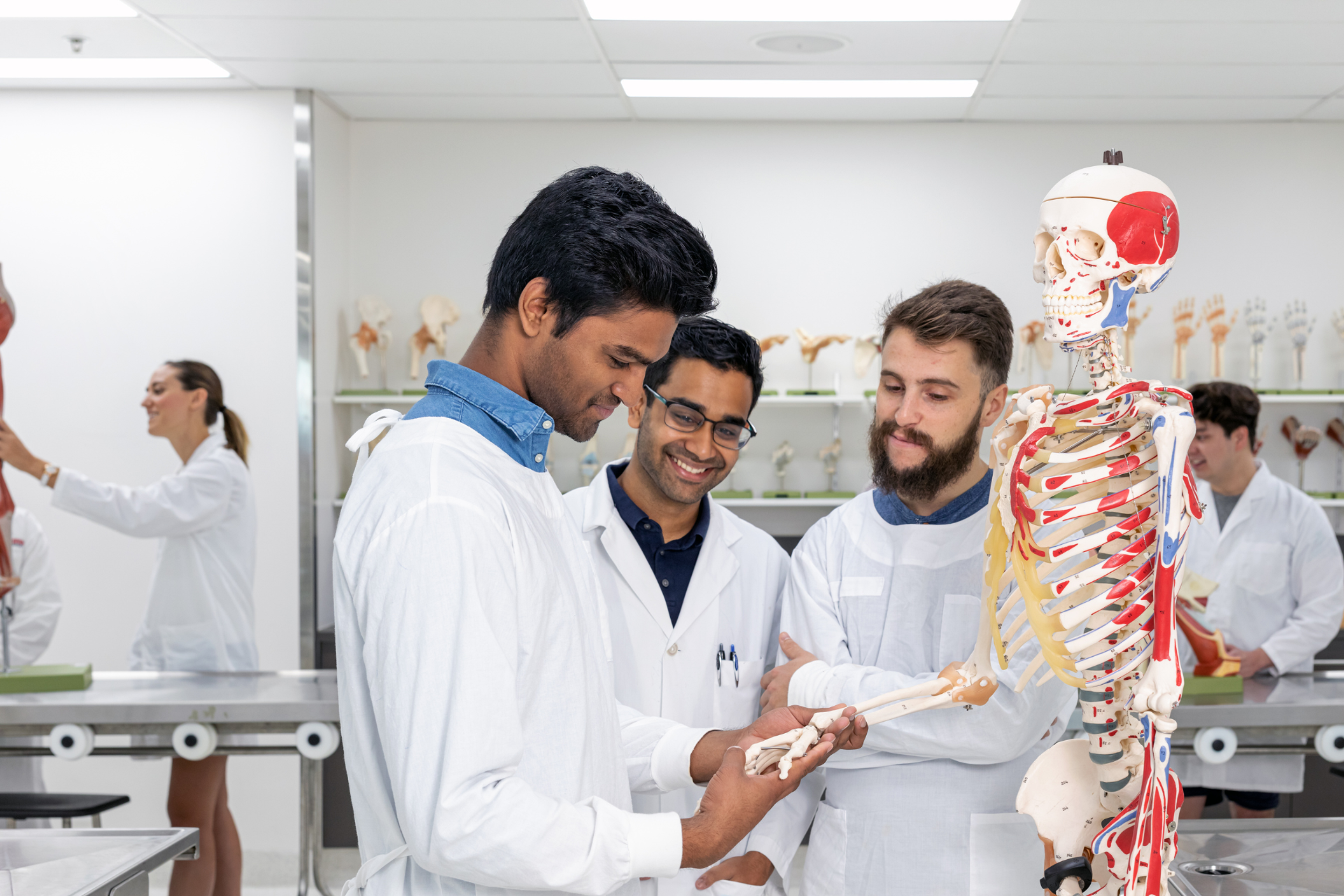The Top 15 Schools for Dermatology
Discover the top 15 schools for dermatology and kick-start your career in skin health.
Posted March 6, 2025

Table of Contents
Dermatology is a specialized field within the medical profession that focuses on the diagnosis, treatment, and prevention of conditions related to the skin, hair, and nails. With its increasing popularity and demand, many aspiring medical students are looking for top-notch institutions to pursue their education and training in dermatology. In this article, we will explore the top 15 schools that offer exceptional programs in dermatology, providing students with the necessary skills and knowledge to excel in their careers.
Top 15 Dermatology Schools
When it comes to choosing the right school for dermatology, several factors need to be considered, including the reputation of the institution, faculty expertise, research opportunities, clinical experience, and alumni success. The following are the top 15 schools that have consistently proved their excellence in the field:
1. Johns Hopkins University - School of Medicine
Renowned for its comprehensive dermatology program, Johns Hopkins offers a rigorous curriculum combined with extensive clinical training.
At Johns Hopkins University School of Medicine, students have the opportunity to learn from some of the most respected dermatologists in the world. The faculty members are not only experts in their field, but they are also dedicated to mentoring and guiding students throughout their educational journey. The program's curriculum is designed to provide students with a strong foundation in dermatology, covering a wide range of topics from basic skin anatomy to advanced treatment techniques. In addition to classroom learning, students also have the chance to gain hands-on experience through clinical rotations at renowned hospitals and clinics.
Explore their dermatology program here.
2. Harvard Medical School
As one of the leading medical schools in the world, Harvard provides students with exceptional faculty, cutting-edge research, and a strong focus on dermatopathology.
Harvard Medical School's Department of Dermatology is known for its commitment to excellence in both education and research. The faculty members are not only highly accomplished in their respective fields, but they are also actively involved in groundbreaking research that is shaping the future of dermatology. Students at Harvard have the opportunity to work alongside these esteemed faculty members, gaining invaluable insights and contributing to the advancement of the field. The program also places a strong emphasis on dermatopathology, providing students with a comprehensive understanding of the microscopic examination of skin samples.
Explore their dermatology program here.
3. Stanford University School of Medicine – Department of Dermatology
Stanford's dermatology program emphasizes a multidisciplinary approach, allowing students to gain expertise in both clinical and research settings.
Stanford University School of Medicine's Department of Dermatology takes a multidisciplinary approach to dermatology education. Students are exposed to various aspects of the field, including clinical dermatology, dermatopathology, and dermatologic surgery. This comprehensive approach allows students to develop a well-rounded skill set and prepares them for a wide range of career opportunities. The program also offers numerous research opportunities, enabling students to contribute to cutting-edge discoveries and advancements in the field.
Explore their dermatology program here.
4.University of California - San Francisco School of Medicine - Department of Dermatology
UCSF offers a comprehensive curriculum that covers a wide range of dermatological conditions, along with specialized tracks for those interested in pediatric dermatology and cosmetic dermatology.
The University of California - San Francisco School of Medicine's Department of Dermatology is dedicated to providing students with a comprehensive education in dermatology. The program's curriculum covers a wide range of dermatological conditions, ensuring that students are well-prepared to diagnose and treat various skin disorders. Additionally, UCSF offers specialized tracks for students interested in pediatric dermatology and cosmetic dermatology. These tracks provide in-depth knowledge and hands-on experience in these specific areas, allowing students to develop expertise in their chosen field.
Explore their dermatology program here.
5. University of Pennsylvania - Perelman School of Medicine - Department of Dermatology
Known for its strong emphasis on research, the dermatology program at UPenn provides students with opportunities to work alongside world-class researchers and innovators.
The University of Pennsylvania's Perelman School of Medicine's Department of Dermatology is renowned for its research-focused approach to dermatology education. Students have the opportunity to work alongside world-class researchers and innovators, contributing to groundbreaking discoveries and advancements in the field. The program's curriculum is designed to foster critical thinking and research skills, equipping students with the tools they need to excel in both clinical practice and academic research. Students also have access to state-of-the-art research facilities and resources, further enhancing their learning experience.
Explore their dermatology program here.
6. Yale School of Medicine - Department of Dermatology
With a focus on translational research, Yale's dermatology program equips students with the skills to effectively bridge the gap between scientific discovery and clinical care.
Yale School of Medicine's Department of Dermatology takes a unique approach to dermatology education, with a strong focus on translational research. The program aims to bridge the gap between scientific discovery and clinical care, ensuring that students are well-prepared to apply research findings to patient care. Students have the opportunity to work on cutting-edge research projects, collaborating with faculty members who are at the forefront of dermatological research. This hands-on research experience not only enhances students' understanding of the field but also prepares them to become leaders in dermatology.
Explore their dermatology program here.
7. Washington University School of Medicine in St. Louis - Division of Dermatology
This program offers a strong foundation in clinical dermatology, with a particular focus on dermatopathology and comprehensive surgical procedures.
The Washington University School of Medicine in St. Louis - Division of Dermatology is dedicated to advancing knowledge and improving patient care in the field of dermatology. They have experts conducting cutting-edge research in various areas including cutaneous biology, oncology, and immunology, fostering a dynamic environment of innovation and discovery. With clinics spread across the St. Louis area, WUS School of Medicine's physicians and clinical staff are deeply committed to addressing all aspects of skin health, offering specialized services in clinical dermatology, dermatologic and cosmetic surgery, pediatric dermatology, and dermatopathology.
Through WUS School of Medicine's residency and fellowship programs, they are devoted to nurturing the next generation of dermatology professionals, equipping them with the skills and knowledge needed to excel as clinicians, educators, and researchers. They comprehensive training programs provide diverse clinical and scientific opportunities, aligning with their mission to integrate patient care, research, and education in dermatology to cultivate exceptional leaders and scholars in the field.
Explore their dermatology program here.
8. University of Michigan Medical School - Department of Dermatology
Known for its collaborative environment, Michigan's dermatology program provides students with exposure to a diverse patient population and cutting-edge research opportunities.
The University of Michigan Medical School's Department of Dermatology is known for its collaborative and inclusive environment. Students have the opportunity to work alongside faculty members who are dedicated to fostering a supportive learning environment. The program also provides students with exposure to a diverse patient population, allowing them to develop cultural competence and an understanding of the unique dermatological needs of different communities. Additionally, the program offers cutting-edge research opportunities, enabling students to contribute to advancements in the field.
Explore their dermatology program here.
9. University of Pittsburgh School of Medicine - Department of Dermatology
The University of Pittsburgh School of Medicine - Department of Dermatology is dedicated to excellence in patient care and resident education, fostering an environment where aspiring dermatologists can thrive. Their UPMC Medical Education Program (UPMCMEP) in Dermatology is committed to providing comprehensive training in both clinical and basic science aspects of dermatology, ensuring that resident physicians become proficient in diagnosing and treating a wide range of skin, hair, nail, and mucous membrane conditions.
With a focus on core competencies outlined by the Accreditation Council on Graduate Medical Education, UPMC's program emphasizes patient care, medical knowledge, practice-based learning and improvement, interpersonal and communication skills, professionalism, and system-based practice. UPMC adheres to the guidelines established by the American Board of Dermatology to ensure that their residents meet eligibility requirements for certification.
Additionally, UPMC's department is committed to promoting diversity, equity, and inclusion in dermatology through initiatives such as their Antiracism and Equity Committee, which works to raise awareness, foster dialogue, and implement practices that promote healthcare equity and address disparities in dermatologic care.
Explore their dermatology program here.
10. Northwestern University Feinberg School of Medicine - Department of Dermatology
The Northwestern University Feinberg School of Medicine - Department of Dermatology is committed to advancing the field of dermatology through cutting-edge research and comprehensive training programs. The school emphasizes the importance of research in both laboratory and clinical settings, with the ultimate goal of enhancing clinical dermatologic care and improving patient outcomes. Their department is proud to offer a training grant (T32) in cutaneous biology, designed to cultivate the next generation of independent scientists in the field.
Through a combination of mentoring, didactic conferences, research seminars, journal clubs, and hands-on experience, Northwestern University Feinberg School of Medicine's fellowship program provides fellows with a strong foundation in cutaneous biology and equips them with the skills to rigorously apply the scientific method to address key questions in dermatology. Northwestern University is dedicated to fostering an environment where outstanding fellows can thrive and contribute to advancements in dermatologic research, ultimately benefiting patients and the broader medical community.
Explore their dermatology program here.
11. University of California - Los Angeles Division of Dermatology
The University of California - Los Angeles (UCLA) Division of Dermatology is dedicated to excellence across its clinical, research, and education programs. They deliver top-tier care to individuals with a broad spectrum of dermatological needs, ranging from medical conditions to surgical interventions to cosmetic procedures. Additionally, UCLA offers cutting-edge cosmetic dermatology services in their state-of-the-art facilities across multiple locations including Beverly Hills, Burbank, Encino, Redondo Beach, Santa Clarita, Santa Monica, Thousand Oaks, and Westwood.
UCLA Division of Dermatology's research program strives to push the boundaries of dermatological knowledge and treatment. Their physician scientists and research team have secured NIH funding and are engaged in groundbreaking work across various areas such as melanoma, skin immunity and defense mechanisms, molecular genetics, vitamin D, bioinformatics on skin diseases, vaccination strategies, and other innovative research aimed at translating bench discoveries into bedside treatments.
UCLA Division of Dermatology's educational curriculum is designed to shape students into exceptional physicians and scientists equipped to lead the future of dermatological innovation. Additionally, UCLA Division of Dermatology is affiliated with the Ronald Reagan UCLA Medical Center, consistently ranked among the nation's best hospitals, further enhancing their ability to deliver exceptional care to their patients.
Explore their dermatology program here.
12. University of Iowa – Carver College of Medicine
This program provides students with an extensive clinical experience, exposing them to a wide range of dermatological conditions in both urban and rural settings.
The University of Iowa Carver College of Medicine's Department of Dermatology provides students with an extensive clinical experience. Students have the opportunity to work in both urban and rural settings, gaining exposure to a wide range of dermatological conditions. This diverse clinical experience prepares students to handle various cases and equips them with the skills necessary to provide comprehensive dermatological care. The program also emphasizes the importance of patient-centered care, ensuring that students develop strong communication and interpersonal skills that are essential for building meaningful relationships with patients.
Explore their dermatology program here.
13. Emory University School of Medicine - Department of Dermatology
With its comprehensive curriculum and emphasis on patient-centered care, Emory's dermatology program trains students to become well-rounded dermatologists.
Emory University School of Medicine's Department of Dermatology is dedicated to training a diverse cohort of future dermatologists who aspire to become leaders in the field. They support and train residents to achieve excellence in patient care through service, education, research, and advocacy. Graduates of Emory University's dermatology program are equipped to provide competent and compassionate dermatologic care to all patients with dignity, respect, and professionalism.
In addition to their residency program, the Department of Dermatology offers four distinct fellowship programs to further advance specialized training and expertise in dermatologic subfields:
- Autoimmune Blistering Disease Fellowship
- Dermatopathology Fellowship
- Micrographic Surgery and Dermatologic Oncology Fellowship
- Pediatric Dermatology Fellowship
Through these fellowship programs, Emory University School of Medicine aims to provide fellows with comprehensive training and mentorship to excel in their chosen areas of specialization and contribute to the advancement of dermatologic knowledge and patient care.
Explore their dermatology program here.
14. Mayo Clinic Department of Dermatology
Mayo Clinic offers a unique learning experience, combining clinical training with research opportunities and exposure to complex dermatological cases.
Mayo Clinic's Department of Dermatology offers a unique learning experience that combines clinical training, research opportunities, and exposure to complex dermatological cases. Students have the opportunity to work alongside experienced dermatologists, gaining hands-on experience and developing the skills necessary to provide comprehensive patient care. The program also offers numerous research opportunities, allowing students to contribute to advancements in the field. Additionally, Mayo Clinic is known for its expertise in handling complex dermatological cases, providing students with exposure to challenging cases that further enhance their clinical skills and knowledge.
Explore their dermatology program here.
15. University of Miami Miller School of Medicine
Dr. Phillip Frost Department of Dermatology and Cutaneous Surgery places a strong emphasis on cultural competence and equips students with the skills to provide dermatological care to diverse populations.
The University of Miami Miller School of Medicine's provides dermatological care to diverse populations. Students have the opportunity to work with a diverse patient population, gaining exposure to various cultural practices and beliefs that may influence dermatological care. The program's curriculum includes training in cultural competence, ensuring that students are well-prepared to provide high-quality care to patients from different backgrounds. Additionally, University of Miami Miller School of Medicine's dermatology program offers specialized training in the diagnosis and treatment of dermatological conditions that are more prevalent in specific populations.
Explore their dermatology program here.
Dermatology Program Overview
Each of the top 15 schools mentioned above provides a comprehensive dermatology program designed to equip students with the knowledge and skills required to excel in the field. The programs typically consist of a combination of didactic coursework, hands-on clinical training, research opportunities, and elective rotations in specialized areas of dermatology.
The curriculum covers a wide range of topics, including dermatopathology, cutaneous surgery, pediatric dermatology, cosmetic dermatology, and dermatologic research. Students learn to diagnose and treat various skin conditions, develop surgical skills, and gain a deep understanding of the underlying mechanisms of dermatological diseases.
Admission Process
The admission process for dermatology programs varies across institutions. However, it typically involves a competitive application process, which includes submitting academic transcripts, letters of recommendation, personal statements, and a curriculum vitae. Some schools may also require applicants to complete an interview.
Due to the high demand for dermatology programs, admission can be highly competitive. It is essential for prospective students to excel academically, demonstrate a strong interest in dermatology through research or clinical experience, and exhibit excellent interpersonal and communication skills.
Training and Clinical Rotations
Once admitted to a dermatology program, students undergo extensive training and clinical rotations. These rotations expose students to a wide range of dermatological cases, enabling them to apply their knowledge and skills in a supervised clinical setting.
During these rotations, students work closely with experienced faculty members and clinical preceptors, learning to diagnose and treat common dermatological conditions such as acne, eczema, psoriasis, and skin cancer. They also gain exposure to rare and complex cases, further expanding their diagnostic abilities.
Students are also encouraged to participate in research projects and scholarly activities. This provides them with the opportunity to contribute to the advancement of dermatological knowledge and develop essential research skills.
Career in Dermatology
A career in dermatology offers numerous opportunities for personal and professional growth. Dermatologists can choose to work in various settings, including private practices, hospitals, research institutions, and academic medical centers.
As a dermatologist, one can specialize in different areas, such as cosmetic dermatology, pediatric dermatology, dermatopathology, dermatologic surgery, or medical dermatology. This allows for specialization in specific patient populations or treatments, catering to individual interests and passions. Dermatologists also have the opportunity to engage in academic research, medical education, and leadership roles within professional organizations.
With the ever-increasing demand for dermatological care and advancements in treatment options, a career in dermatology offers a rewarding and fulfilling path for aspiring medical professionals.
Read these next: A Guide to the T20 Medical Schools in the U.S. and Exploring the Salary Range of Dermatologists: Factors and Insights












